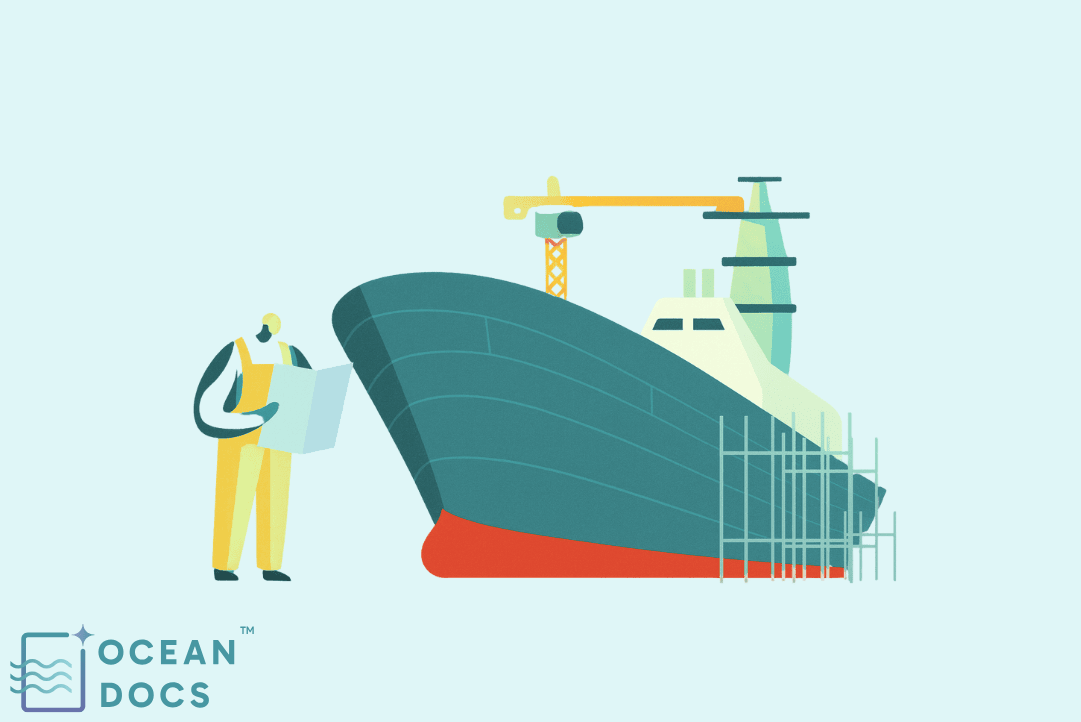
Essential Shipping Documents: Staying Audit-Ready with OceanDocs
September 1, 2025 By OceanDocs AI
Shipping is one of the most heavily regulated industries in the world, and for good reason: vessels carry thousands of lives, tons of cargo, and operate in complex international environments. A critical part of ensuring smooth operations and compliance with international conventions lies in maintaining the right shipping documents. These documents serve as proof of compliance, evidence of crew qualifications, and readiness for audits or Port State Control (PSC) inspections.
However, in practice, document management can be overwhelming. Ship operators juggle dozens of certificates, records, and manuals, all of which need to be updated, accessible, and audit-ready at a moment’s notice. Missing or outdated paperwork is one of the most common reasons vessels face fines or detention. This blog explores the most essential shipping documents and how digital platforms like OceanDocs simplify their management.
Why Documentation Matters in Shipping
Documentation is more than an administrative requirement—it is the backbone of safety and compliance. Whether it’s demonstrating crew competency, proving a vessel’s seaworthiness, or meeting international obligations under SOLAS, MARPOL, and the ISM Code, shipping documents provide the evidence that operators are doing their part.
During inspections, auditors and regulators rarely take an operator’s word at face value; they ask for documented proof. If those documents are missing, incomplete, or inaccessible, the consequences can be severe—ranging from financial penalties to vessel detention. This is why effective documentation is not just about ticking boxes—it is about building trust with regulators, charterers, and clients.
Key Shipping Documents for Safety and Compliance
While the exact documentation required may vary depending on the vessel type, flag state, and operating region, certain categories are universally essential:
- Certificates of Registry and Classification: Establish the vessel’s identity, ownership, and compliance with classification society rules.
- Safety Certificates (SOLAS-related): Include Safety Construction, Safety Equipment, and Safety Radio certificates that demonstrate seaworthiness.
- MARPOL Certificates: Cover pollution prevention measures, such as the International Oil Pollution Prevention Certificate (IOPP).
- Crew Certificates and Endorsements: Proof of competency, training, and STCW compliance.
- ISM Code Documentation: Safety Management Certificates (SMC) and Document of Compliance (DOC).
- Cargo-related Documents: Bills of lading, manifests, and dangerous goods declarations.
- Logbooks and Records: Oil Record Books, Garbage Record Books, GMDSS logs, and drill records.
Each of these documents has specific requirements for format, validity, and availability. Together, they form the legal and operational framework that keeps shipping both safe and accountable.
Real-Life Consequences of Poor Documentation
The importance of documentation becomes clear when considering real-world cases. For instance, vessels detained by Port State Control authorities often cite documentation deficiencies as the primary cause. A missing Garbage Record Book entry or an expired Safety Equipment Certificate can lead to immediate detention. Such detentions not only delay operations but also tarnish a company’s reputation with clients and insurers.
Beyond inspections, documentation also matters in legal disputes and insurance claims. In the event of an incident, clear and accurate documentation can protect a company from liability, while incomplete records can expose them to costly consequences. These examples highlight why robust documentation practices are indispensable in maritime operations.
Challenges in Managing Shipping Documents
Despite its importance, document management remains one of the biggest challenges in shipping. Operators often deal with:
- Volume of paperwork: A single vessel can carry hundreds of documents.
- Global operations: Ships move across jurisdictions, each with its own inspection practices.
- Crew turnover: New crew may not always be familiar with the vessel’s filing systems.
- Paper-based records: Vulnerable to loss, damage, or errors.
- Frequent updates: Certificates and endorsements often have strict renewal timelines.
These challenges create gaps that regulators and auditors are quick to identify, putting companies at constant risk of non-compliance.
How OceanDocs Simplifies Documentation
OceanDocs is designed to help maritime companies overcome these documentation challenges through digital transformation. By moving away from paper and fragmented spreadsheets, OceanDocs offers a centralized and secure solution for compliance management. Its features include:
Centralized Repository: All essential shipping documents stored in one secure, cloud-based platform.
Audit-Ready Dashboards: Real-time visibility of certificate validity and document status.
Automated Alerts: Notifications for certificate expirations, drill reminders, and renewal deadlines.
Shore-Ship Connectivity: Both ship and shore teams have synchronized access to documents, reducing gaps during inspections.
Mobile Access: Crew can upload and access records from anywhere, even while at sea.
With OceanDocs, operators can avoid last-minute scrambles before inspections and ensure consistent compliance across fleets. The platform transforms documentation from a burden into a strategic advantage.
The Future of Shipping Documentation
The shipping industry is gradually moving towards fully digital documentation. Initiatives like electronic Oil Record Books and digital logbooks are gaining acceptance from regulators. The IMO and classification societies are encouraging greater adoption of electronic certificates. This shift not only improves efficiency but also reduces the environmental footprint associated with paper-based systems.
As this digital transformation continues, platforms like OceanDocs will play a crucial role in bridging the gap between traditional practices and future-ready compliance.
Final Thoughts
Essential shipping documents form the foundation of maritime compliance, safety, and accountability. While managing them can be challenging, their importance cannot be overstated. For companies, robust documentation is not just about avoiding fines—it is about building trust, protecting crew, and ensuring smooth global operations.
With OceanDocs, operators can simplify documentation management, stay inspection-ready, and focus on what matters most: safe and efficient voyages.
Call to Action:
Streamline shipping documentation with OceanDocs and keep your fleet always prepared for audits, inspections, and global compliance.